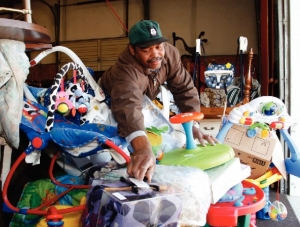New law has thrift stores worried about the toys on their shelves
By Bonnie Edwards
Published in News on February 15, 2009 2:00 AM

News-Argus/BOBBY WILLIAMS
Jesse Sutton, employee at Second Fling consignment shop, stacks some of the toys and other items recently pulled from the store's shelves because of a new federal law concerning lead levels and the sale of such items.
Shoppers at several Goldsboro second-hand stores were greeted by empty spaces last week as employees began pulling children's toys and other products off the shelves in response to a new federal law.
Put into effect Tuesday, the Consumer Product Safety Improvement Act, prompted by massive toy recalls in 2008, forbids the sale of anything for children under 12 in the U.S. if it contains more than 600 parts per million of lead.
But while many newer items meet the standard, most local thrift stores have no way to test their used children's products for lead content, said Steve Snyderman from the Raleigh Goodwill Community Foundation office. And even if they could, he added, the testing is extremely expensive and labor intensive.
And so on Tuesday, the employees at the local Goodwill store were busy pulling all toys off the shelves, as well as any children's clothing that contained zippers, snaps or plastic. Their strollers and car seats had to go, too.
Snyderman said the new law is really going to hurt his organization, which has provided the local Goodwill stores with signs explaining that donations of children's toys and accessories can no longer be accepted.
"We don't have a choice. We've gotten a lot of calls from irate shoppers who don't understand the new law," he said. "I truly regret this. And there doesn't appear to be any legal relief in sight."
At the Second Fling consignment shop, Ruth Holloman and her staff loaded three pickup trucks with toys, strollers, car seats and baby furniture to pack into the store's warehouse for people to come pick up and take back home. Other smaller toys that had been in the store for a while she simply threw away, including about 500 stuffed animals, even though they weren't likely to contain lead.
She explained that when she found out about the new law in January, she started studying up on it on the Internet.
"The government sent us nothing, and they said we are the ones who would be responsible," she said. "This has got a lot of people upset. They sprung it on us pretty fast."
As she researched the new law, it ended up being a two-inch thick print-out and pages on pages of recalls.
So, rather than being caught in non-compliance and fined $100,000 for having a wrong item, she took all toys and accessories out of the store.
"This is making a hardship for younger people who have children and can't afford to buy these things new," she said.
Joni Williams of the Nahunta community has two children, ages 7 and 11, and said she regularly shops at Goodwill and other thrift stores and is concerned about being able to make future purchases there.
"They (the government) have made me really mad," she said. "We need to be concerned about lead, but why go overboard?"
The new law also is going to hurt consignment and thrift store owners, Mrs. Holloman said.
"A lot are saying they are going to have to close their stores," she said.
But Trish de la Motte is not worried about her resale store, Once Upon a Child. The toys, clothing and furniture there are safe, she said.
That is because her store is a franchise, and the franchisor has worked with the Consumer Product Safety Commission and gotten advice about what not to buy.
"We have a list of what is OK to buy and what is not OK to buy," she said
When it comes to baby equipment and furniture, she has never purchased anything more than five years old to make sure it's up to standard. Every piece that comes in must have the manufacturer's label on it. And she never buys painted furniture.
But now, she's being even more extra careful.
"We've been very pro-active," she said. "In October we were shocked to find out about the new law. We started talking to the franchisor about it, and now I feel comfortable with it. It's a huge concern, and we are very careful what we buy."
And if something is recalled after she buys it, she throws it away.
Ms. de la Motte also has sent e-mails to her customers to let them know the precautions the franchise has taken to make sure everything in the store is safe.
She said it is surprising how few parents know about the new law.
In California, she said, most parents coming into the Once Upon a Child stores ask about the new safety guidelines.
But in Goldsboro, very few do.
Fortunately, most children's store owners and managers have heard of it, even those that sell only new items like Noah's Nook.
Noah's Nook manager Gloria Rouse recently returned from a meeting where manufacturers assured buyers that everything had been tested and found safe.
But how about children's items made last year? Five years ago?
There is no easy answer, said Patty Davis of the Consumer Protection Safety Commission, adding that concerned parents can visit the commission's Web site at www.cpsc.gov and pull up recall lists by manufacturer or by individual product type.
"No limit was ever placed on the amount of lead that the government would allow in children's items before the new law was passed," she said.
And the guidelines are going to get stricter, she said. From 600 parts per million now, the limit will soon become 300 parts per million. And in August 2010, the limit will be 100 parts per million.
